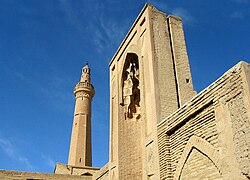Nain (Persian: نائین)[a] is a city in the Central District of Nain County, Isfahan province, Iran, serving as capital of both the county and the district.[4]
Nain
Persian: نائین | |
|---|---|
City | |
 | |
| Coordinates: 32°51′28″N 53°05′04″E / 32.85778°N 53.08444°E[1] | |
| Country | Iran |
| Province | Isfahan |
| County | Nain |
| District | Central |
| Population (2016)[2] | |
• Total | 27,379 |
| Time zone | UTC+3:30 (IRST) |
History
editThe history of Nain appears to go back to pre-Islamic times, but no information about it has survived. It is famous for its big castle and its congregational mosque, the Jameh Mosque of Nain. It was described by medieval historians to have been in the sardsīr ("cooler highland areas"), and being a subordinate to either Yazd or Isfahan, despite being part of the administration of the Fars province.
The historian and geographer Hamdallah Mustawfi reported that the walls of Nain's castle, which are still present as mud brick remnants, were four thousand paces long. The nearby mountains' silver mines are also described by the geographers. During the Safavid era, the kaolinite of Nain was utilized to manufacture porcelain at the city of Kashan.[5]
Under the Buyid dynasty (934–1062), the Jameh Mosque of Nain was constructed.[5]
Demographics
editLanguage
editThe following graph depicts the language composition of the city. Naini is a Central Plateau language[6] which is part of the Northwestern Iranian languages.[7]
Population
editAt the time of the 2006 National Census, the city's population was 24,424 in 6,954 households.[8] The following census in 2011 counted 25,379 people in 7,730 households.[9] The 2016 census measured the population of the city as 27,379 people in 8,906 households.[2]
See also
editMedia related to Nain, Iran at Wikimedia Commons
Na'in travel guide from Wikivoyage
Notes
editReferences
edit- ^ OpenStreetMap contributors (1 December 2024). "Nain, Nain County" (Map). OpenStreetMap (in Persian). Retrieved 1 December 2024.
- ^ a b Census of the Islamic Republic of Iran, 1395 (2016): Isfahan Province. amar.org.ir (Report) (in Persian). The Statistical Center of Iran. Archived from the original (Excel) on 19 October 2020. Retrieved 19 December 2022.
- ^ Nain, Iran can be found at GEOnet Names Server, at this link, by opening the Advanced Search box, entering "-3076275" in the "Unique Feature Id" form, and clicking on "Search Database".
- ^ Habibi, Hassan (c. 2024) [Approved 21 June 1369]. Approval of the organization and chain of citizenship of the elements and units of the national divisions of Isfahan province, centered in the city of Isfahan. lamtakam.com (Report) (in Persian). Ministry of the Interior, Defense Political Commission of the Government Board. Proposal 3233.1.5.53; Letter 93808-907; Notification 82838/T131K. Archived from the original on 4 February 2024. Retrieved 4 February 2024 – via Lam ta Kam.
- ^ a b Bosworth & Ruggles 2019.
- ^ "Language distribution: Esfahan Province". Iran Atlas. Retrieved 26 February 2023.
- ^ Stilo 2007, pp. 93–112.
- ^ Census of the Islamic Republic of Iran, 1385 (2006): Isfahan Province. amar.org.ir (Report) (in Persian). The Statistical Center of Iran. Archived from the original (Excel) on 20 September 2011. Retrieved 25 September 2022.
- ^ Census of the Islamic Republic of Iran, 1390 (2011): Isfahan Province. irandataportal.syr.edu (Report) (in Persian). The Statistical Center of Iran. Archived from the original (Excel) on 17 January 2023. Retrieved 19 December 2022 – via Iran Data Portal, Syracuse University.
Sources
edit- Bosworth, C. Edmund; Ruggles, D. Fairchild (2019). "Nāʾīn". In Fleet, Kate; Krämer, Gudrun; Matringe, Denis; Nawas, John; Rowson, Everett (eds.). Encyclopaedia of Islam (3rd ed.). Brill Online. ISSN 1873-9830.
- Stilo, Donald (2007). "Isfahan xxi. Provincial Dialects". In Yarshater, Ehsan (ed.). Encyclopædia Iranica, Volume XIV/1: Isfahan IX. Pahlavi period–Isfahan XXII. Gazi dialect. London and New York: Routledge & Kegan Paul. pp. 93–112. ISBN 978-0-933273-99-3.
